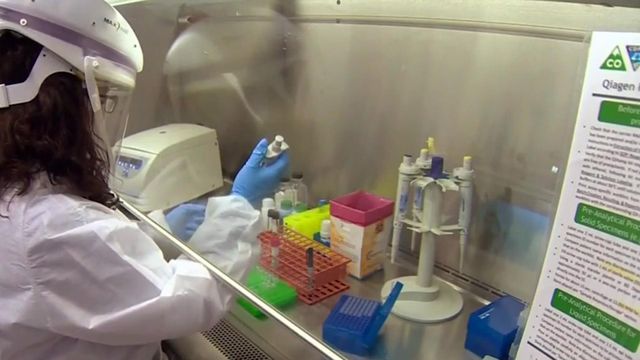State lab to start checking for coronavirus variant in NC
North Carolina's public health lab will soon start gene sequencing efforts to determine if a variant of the coronavirus is circulating in the state.
Posted — Updated"It's not surprising that this variant was picked up in the U.K. first. They have really good sequencing," said Lisa Gralinski, an epidemiologist in the Gillings School of Global Public Health at the University of North Carolina at Chapel Hill. "They have government funding to be doing this all the time, so they ended up sequencing something like 7 to 10 percent of all of their cases. In the U.S., we have nothing like this."
Local health experts suspect the variant could already be in North Carolina. But like all states, North Carolina is just trying to keep up with testing and tracking for the known virus, so it has been sending five positive samples to the Centers for Disease Control and Prevention every other week since November to be analyzed for the variant.
"They were asking for a relatively small number of samples," State Epidemiologist Dr. Zack Moore said. "They've ramped that up now so that we're sending more than 30 specimens."
To put the numbers analyzed by the CDC into perspective, North Carolina has been averaging close to 6,000 positive virus tests a day in recent weeks.
"I think it's important that we have a lot of humility when we're talking about our understanding of COVID," Moore said.
The state lab already conducts gene sequencing on other viruses like food-borne illnesses, and he said it plans to ramp up its own test for the coronavirus variant.
"We've got the capabilities, but at this point, the percentage of positive samples that have actually been sequenced is very low," he said.
"A new variant doesn't need to be particularly more deadly to cause a huge amount of stress to our society," Gralinski said. "Just the fact that, if you say, previously, maybe 10 people were infected, and they would each spread it to maybe one more person, so 10 people leads to 10 people leads to 10 people. Now, maybe we have a situation where 10 people leads to 15 people, and then it just goes kind of exponentially from there."
Moore said he doesn't think the variant is behind the record-setting numbers of COVID-19 patients in North Carolina hospitals – the number was just short of 3,500 on Thursday.
"But it's certainly possible that this variant is here and that it could become more of a concern in North Carolina," he said.
Related Topics
• Credits
Copyright 2024 by Capitol Broadcasting Company. All rights reserved. This material may not be published, broadcast, rewritten or redistributed.






